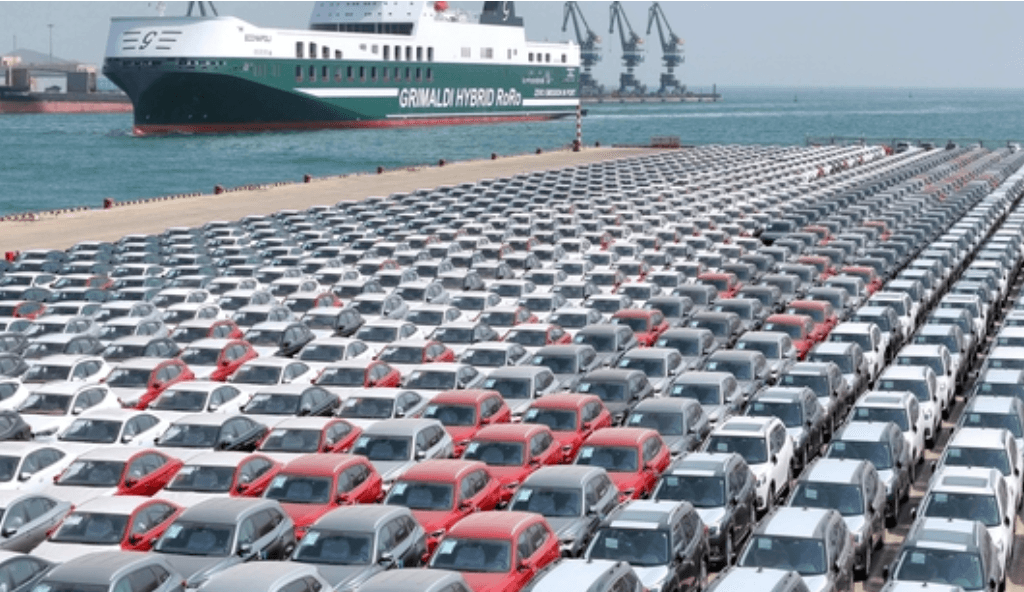The recent proposal by former U.S. President Donald Trump to impose a 25% tariff on auto imports has sparked concerns across the global automobile industry. If implemented, this tariff could have significant repercussions for Indian automotive companies that export vehicles and auto components to the United States. This move, aimed at protecting domestic U.S. manufacturers, could alter trade dynamics and impact the profitability of several Indian firms.

Understanding the 25% Auto Tariff
Donald Trump has long been an advocate for reducing America’s reliance on imported goods, particularly in the automobile sector. The proposed 25% tariff is intended to encourage domestic manufacturing by making foreign imports more expensive. However, this decision could adversely affect automakers and auto parts manufacturers that export to the U.S., including several key Indian companies.
Major Indian Companies Likely to be Impacted
- Tata Motors
- Tata Motors, the parent company of Jaguar Land Rover (JLR), is one of the biggest Indian automakers with a strong presence in the U.S. market.
- A 25% tariff could significantly increase the cost of JLR vehicles in the U.S., making them less competitive compared to American-made luxury brands.
- This could result in reduced sales and impact revenue generation for Tata Motors.
- Mahindra & Mahindra
- Mahindra has been actively selling its off-road vehicles and tractors in the U.S. market.
- Higher tariffs may lead to increased prices, which could reduce the demand for its products.
- Mahindra’s planned expansion in the U.S. may also be affected due to the additional costs imposed by the tariff.
- Maruti Suzuki (via Suzuki Motor Corporation)
- While Maruti Suzuki itself does not export large volumes of vehicles to the U.S., its parent company, Suzuki, has a stake in global exports.
- If supply chains and manufacturing costs increase, Maruti Suzuki could indirectly face the impact of price hikes on components and raw materials.
- Bajaj Auto & TVS Motors
- Indian two-wheeler manufacturers like Bajaj Auto and TVS Motors have been expanding their footprint in the U.S.
- If tariffs extend to motorcycles and scooters, these companies may experience a decline in sales due to higher pricing.
- Eicher Motors (Royal Enfield)
- Eicher Motors, the maker of Royal Enfield motorcycles, could also feel the impact, as the U.S. is an important market for its 650cc models.
- The increase in import costs may lead to a decline in sales, affecting the company’s revenue from one of its key international markets.
- Auto Component Manufacturers
- India is a major supplier of auto components to the U.S., with companies like Bharat Forge, Motherson Sumi Systems, and Sundaram Fasteners playing a crucial role.
- The 25% tariff on auto imports may also extend to components, making Indian exports less attractive to U.S. automakers.
- This could force these manufacturers to absorb additional costs or pass them on to consumers, making Indian products less competitive.
- Samvardhana Motherson International Ltd
- As one of India’s leading auto component manufacturers, Samvardhana Motherson International Ltd has a strong footprint in both Europe and the U.S.
- It supplies parts to major American automakers, including Tesla and Ford.
- However, with established manufacturing units in the U.S. and Europe, the company is relatively shielded from the impact of import tariffs, unlike firms that rely solely on exports.
- Other Key Component Manufacturers
- Other major Indian auto component makers with significant export exposure include Bharat Forge, Sansera Engineering Ltd, Suprajit Engineering, and Balkrishna Industries.
- These companies have a substantial presence in global supply chains, and a tariff hike could impact their export revenues.
Broader Impact on India’s Auto Industry
- Reduced Export Demand: The high tariff would make Indian vehicles and auto parts more expensive in the U.S., leading to a potential decline in export volumes.
- Impact on Jobs & Manufacturing: If exports shrink, Indian manufacturers may be forced to cut jobs or scale down production.
- Trade Relations Between India & the U.S.: The tariff could strain trade relations, prompting India to consider countermeasures or seek alternative markets.
- Potential Supply Chain Disruptions: Companies that rely on U.S.-made components may also face higher import costs, affecting production efficiency.
- Overall Auto Component Export Impact: In the financial year 2024, India exported auto components worth $21.2 billion, contributing to the global auto component market, which stands at $1.2 trillion.
- Dependence on U.S. & European Markets: Shipments to the U.S. and Europe, the world’s biggest importers of auto parts, made up approximately 4.5% of the total global trade, highlighting the risk posed by the tariff.
Possible Countermeasures & Strategies
To mitigate the impact of the 25% auto tariff, Indian companies might consider:
- Diversifying Export Markets: Expanding into European and Asian markets to offset losses from the U.S.
- Setting Up Local Manufacturing in the U.S.: Companies like Mahindra have already invested in U.S. plants, which could help them bypass tariffs.
- Negotiating Trade Agreements: The Indian government could engage in discussions with the U.S. to seek exemptions or reduced tariff rates for specific categories.
- Enhancing Cost Efficiency: Streamlining operations to reduce production costs and remain competitive despite higher tariffs.
Conclusion
Donald Trump’s proposed 25% auto tariff could create significant challenges for Indian automakers and auto component manufacturers with exposure to the U.S. market. Companies like Tata Motors, Mahindra, Bajaj Auto, Eicher Motors, and major auto parts suppliers may face a decline in exports and increased operational costs. As a result, businesses will need to adapt by diversifying markets, investing in local production, and negotiating trade solutions to minimize financial setbacks. The coming months will be crucial in determining how India’s auto industry responds to these potential trade barriers.
Read: Donald Trump announces 25% tariff on imported cars. What does it mean?
Pingback: Stock Market Soars! Sensex, Nifty 50 Rally as Investors Cash